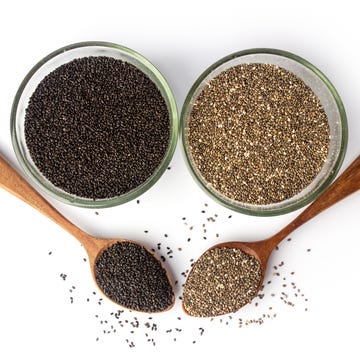If you’re not familiar with inositol, it’s time to change that, as it may provide some surprising health benefits. For starters, it’s helpful to know inositol is a carbohydrate that naturally exists in the human body. “It plays a critical role in cellular function, signal transduction, cell membrane structure and neurotransmitter regulation,” explains Ira P. Monka, DO, a physician specializing in family medicine and the president of the American Osteopathic Association.
Since inositol is present in nature, it may come as no surprise that some foods contain it as well. That said, some research suggests that certain people may benefit from higher amounts of inositol that are difficult to get from food alone. That’s where supplements come in. To figure out if inositol might be a good addition to your daily regimen, we’ve highlighted the research-backed health benefits of inositol below along with safety tips to keep in mind.
Take note: Our registered dietitians in the Good Housekeeping Institute Nutrition Lab review and evaluate every single supplement we recommend in accordance with our dietary supplement methodology. We then have a registered dietitian on our Medical Review Board review each article for scientific accuracy. A supplement should do just that: supplement the diet, not replace high-quality, nutritious food and important healthy lifestyle practices. Check with your healthcare provider before starting any dietary supplement regimen.
Inositol health benefits
These are the four most-studied health issues that inositol supplements may help with.
Food sources
Dr. Monka notes the following inositol can be found in:
- Oranges
- Grapefruits
- Limes
- Fresh vegetables
- Beans
- Grains
- Nuts
Dosage information
Currently, there is no official recommended daily allowance for inositol, so it’s a good idea to ask your physician what they think is best for your body. “Most studies recommend 1,000 to 2,000 milligrams of inositol twice daily, especially if you have polycystic ovary syndrome or insulin resistance,” says Dr. Monka. “But that still means that we need more research in the area before simply recommending increased supplements to your daily routine.”
Inositol side effects
Inositol seems safe and unlikely to produce severe side effects, but one research analysis found that the highest doses studied (12 grams per day) could lead to “mild gastrointestinal side effects such as nausea, flatus and diarrhea.”
“There is much research that needs to be done on inositol levels and its side effects,” says Dr. Monka. “We need to understand more to fully comprehend what take an additional inositol supplement can do to a person’s body.”
The bottom line: An inositol supplement may be beneficial for some people, but a lot is still unknown so it’s smart to talk to your doctor before you take any. “The medical community should invest in more trials and opportunities where inositol can be studied,” says Dr. Monka. “Anything that can potentially help your body process insulin better or relieve issues of mood disorders or depression must be analyzed and examined to see if it produces better health outcomes.”
Dr. Deena Adimoolam, known by many of her patients as "Dr. Deena", received her medical degree and training at the Icahn School of Medicine at Mount Sinai. She then completed her residency training in primary care/internal medicine and subsequent fellowship in endocrinology, diabetes and metabolism at Yale University.
After her many years at Yale, she returned back to Mount Sinai as an Assistant Professor of Medicine and Associate Program Director of the endocrinology fellowship program.
Dr. Adimoolam has published research and written chapters for major textbooks in the areas of diabetes and obesity.
She is passionate for educating the public on disease prevention and hormone health, and uses various media outlets to do so. She serves as a media expert and has worked with most major news organizations in print, online, and television.
She works closely as a spokeswoman for the Endocrine Society - the largest medical organization in the field of endocrinology and metabolism and is very active with other local and national health organizations.













